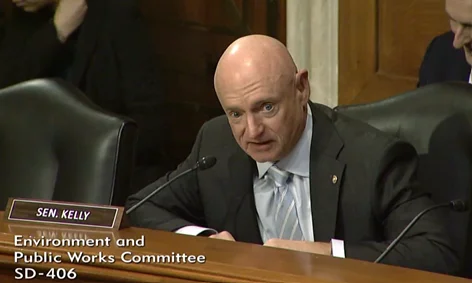WATCH: Sen. Kelly Highlights the Army Corps of Engineers’ Role in Securing Arizona’s Water Future
Last week, during a Senate Environment and Public Works (EPW) Committee hearing, Arizona Senator Mark Kelly highlighted how his Rural Arizona Water Infrastructure Program has allowed the Army Corps of Engineers to help small and underserved communities complete critical water infrastructure projects. Kelly also brought to light the consequences communities face when projects are significantly delayed by federal red tape.
Kelly’s legislation helps communities in Arizona partner with the Corps to build drinking water, water conservation, flood control, and wastewater infrastructure. Thanks to Kelly’s advocacy, the program received more than $200 million in 2022.
During the hearing, Kelly also discussed the costs that communities in Arizona face when vital water infrastructure projects are delayed. To illustrate this, Kelly highlighted the City of Buckeye, Arizona, which has been waiting for more than two years for the Corps to approve a project. Kelly stressed that in the face of a historic drought, Arizona communities have no time to waste completing projects to secure their water future.

Click here to download video of Sen. Kelly’s remarks. See below for a transcript:
Sen. Kelly: This hearing’s really important to identify other ways that the Corps could partner with communities on projects.
One of the things that I have championed with Congressman Stanton, also from Arizona, was the creation of Section 595, the Rural Arizona Water Infrastructure Program. This was about three years ago—one of the first things I did when I got to the United States Senate. I’m coming up on being here for three years. It’s gone by pretty quickly. This 595 helps small and underserved communities in Arizona partner with the Army Corps to build drinking water, water conservation, flood control, and wastewater infrastructure.
When he has appeared before this committee before in the past, Secretary Connor has pointed to this program as an example of how the Army Corps can help make investments in the west to respond to long-term drought conditions. There is just one problem here and that’s that many projects funded through this program still do not have finalized PPA’s [project partnership agreements] with the Corps.
In fact, we have some communities, like the city of Buckeye, Arizona, which has been waiting for more than two years to finalize a project partnership agreement. And these projects are often rather small dollar projects, usually less than $3 million. And especially for projects that help Arizona communities respond to drought conditions, years is too long to wait.
So, Mr. Hague, you mentioned in your testimony that the Nature Conservancy does lots of work with the Corps and local project sponsors. What challenges are faced by local sponsors when it takes years for the Corps to finalize a project partnership agreement?
Jimmy Hague (Senior Water Policy Advisor, The Nature Conservancy): Thank you for the question, Senator. When you have a project that is delayed like that and takes many years, there’s a variety of problems, of course, that could come up. You do think about the issue of time being money, and certainly, with the Army Corps, that is the case as well.
We have been involved in projects where if there is a very long gap between when a project is authorized, originally envisioned and when you can sign a PPA and start construction—things like the cost of real estate at the start of the project can go up dramatically.
We have actually had instances where we have had to come back to Congress and get a project reauthorized at a higher level because of those kind of delays. So, the quicker that you can get to signing, the easier it is. And there are a lot of internal obstacles for them. I think any time you have—you are trying to negotiate a project partnership agreement that requires going up to headquarters level for approval—we do see significant delays, at least of a year in how long that review at headquarters takes.
Sen. Kelly: Have you seen communities just get frustrated by this and give up?
Jimmy Hague: I don’t have an example specifically of where a community has walked away, but a lot of communities I think are either faced with a choice of sort of ‘take it or leave it,’ in a lot of cases. They have a great need that they can only achieve through these kind of projects with the Corps. So, they either need to take the agreement sort of as is, and maybe take on terms that they’re really not comfortable with or push for those kinds of higher level reviews that can delay projects for years and drive up the cost of doing business.
Sen. Kelly: What are some of the tools available, here in my remaining time, that the Corps could use, administrative tools that they could use to sign these agreements?
Jimmy Hague: The Corps has developed a bunch of model agreements—a couple dozen model agreements. These are different template models that you could use for environmental infrastructure projects like you’re discussing, an ecosystem restoration project, a flood control project. There are a variety of different models. And as long as you and your sponsor are willing to accept that model as is, you can get it done very quickly.
But any time you want to seek a deviation from that model, even a non-substantive deviation, that’s going to require review by division. And if you’re wanting substantive deviation, that’s going to require review by headquarters, and that’s where things can really get delayed. But they do have these model agreements and have delegated some decision-making authority from headquarters down the division, so those have helped. But still, anytime you are seeking deviations, that slows things down. And you can’t get around the identification and operations and management challenges we’ve discussed here today either way.
Sen. Kelly: Thank you, Mr. Hague. Thank you, Mr. Chairman.
